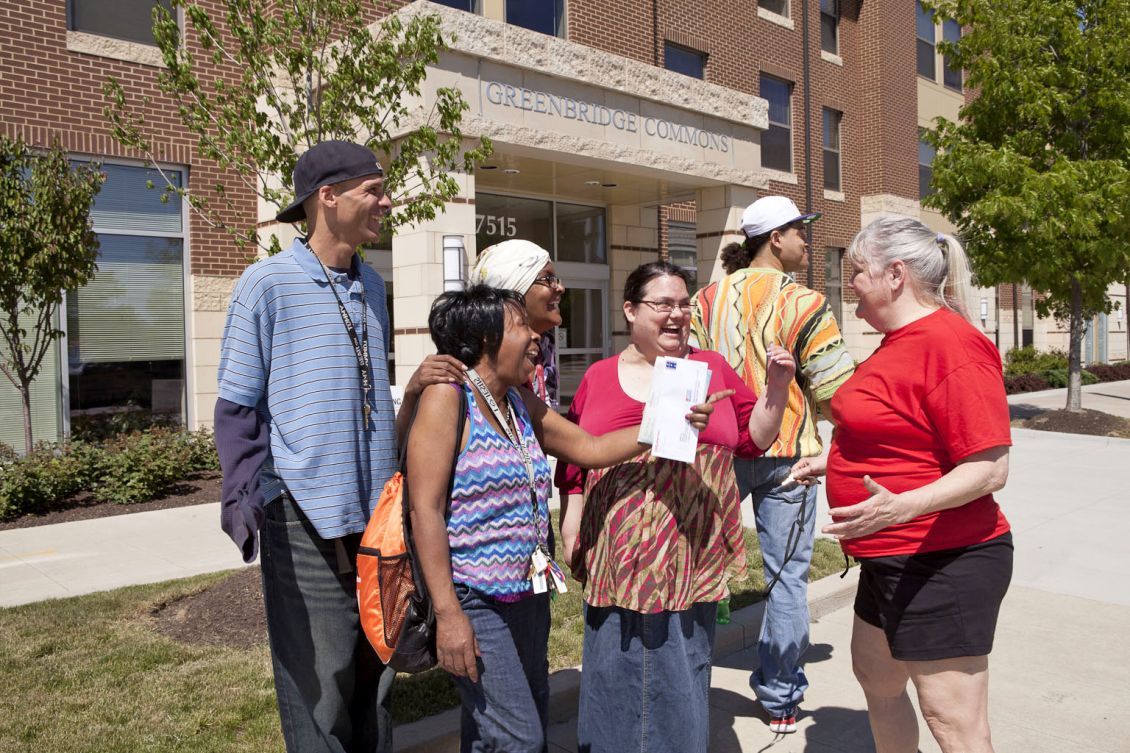This piece is part of our series Policy Actions for Racial Equity (PARE), which explores the many ways housing policies contribute to racial disparities in our country.
In April, Congress reintroduced the Fair Housing Improvement Act of 2023 to ensure that the variety of income sources people use throughout the country to pay their rent don’t pose an obstacle to signing a lease. But why is this legislation necessary in the first place?
For 2.3 million households around the country living with low incomes, rental subsidies in the form of housing vouchers offer the promise of affordable housing. Yet, in many places, legal forms of discrimination create a barrier to realizing that promise.
The Section 8 Housing Choice Voucher (HCV) is the largest of these programs, helping the most households and distributing the greatest amount of money. The “Choice” in the voucher’s title refers to its purpose of allowing voucher holders to use it to help pay rent in any neighborhood where they choose to live, assuming the selected unit meets federal criteria and the landlord accepts the voucher.
However, the HCV’s reliance on landlord acceptance makes it vulnerable to source-of-income discrimination, the practice of denying rental housing opportunities to potential residents because of the source of the money they would use to cover their rent.
As 65% of all voucher holders are people of color, this denial of housing often serves as a proxy for the racial discrimination explicitly barred by the Fair Housing Act (FHA) of 1968. The FHA established protections against discrimination by providers of housing and other actors in the housing system whose actions decrease access to housing because of race or color, religion, sex, national origin, familial status, or disability. This step was needed to reverse the legacy of federal policies that served to shut people of color and other protected groups out of housing opportunities.
Due to source of income – or SOI – discrimination, impacted households lose the “choice” in their HCV – including the ability to decide where to live. They are prevented from taking advantage of better housing, employment, education, health care, transit, recreation, and other opportunities that may be more accessible in low-poverty areas. They also stand to lose out on the improvements in well-being that those living in low-poverty locations may enjoy. Perhaps even more importantly, they lose the opportunity to create the lifelong economic benefits for children that increase with every year a child lives in a low-poverty environment. One study suggests that using a voucher to move a child from public housing to a low-poverty neighborhood at the age of 8 could (on average) boost that child’s total lifetime earnings by about $302,000. Over time, these moves would also help deconcentrate poverty and reduce racial segregation in high poverty neighborhoods.
SOI discrimination weakens a critical tool for combating both concentrated poverty and racial segregation. When combined, these inequities produce concentrated disadvantage, which is associated with multiple harms that are particularly damaging for children. They include poorer-quality schools, heightened environmental hazards (including lead), fewer safe outdoor spaces in which children can play, greater exposure to certain adverse childhood experiences (such as witnessing violence), and reduced economic mobility.
In addition, voucher holders are disproportionately women and persons with disabilities, so SOI discrimination functions to subvert FHA safeguards for these protected groups as well. SOI discrimination also hurts other voucher holders including veterans, as well as people who rely on nontraditional sources of income such as social security and child support.
In efforts to block SOI discrimination, a national patchwork of SOI protections at the state and local level has emerged. However, these laws cover only 57% of the voucher holding population. Just 19 states ban it outright; others have protections only in certain localities; still others ban certain forms of income discrimination, yet explicitly allow landlords to reject Housing Choice Voucher holders. Seventeen states have no SOI laws at all. As a result, landlords and residents are less likely to know and follow the law, and smaller jurisdictions have trouble enforcing it. Reporting discrimination can be difficult when residents first have to determine if a landlord violated city, county, or state law.
We know that SOI protections work. Studies have found that landlords in areas with SOI protections reject tenants with vouchers around half as often as landlords in places without them and that areas with income discrimination bans have higher rates of voucher utilization and see more moves to neighborhoods with lower poverty rates. However, recent examples in Los Angeles and New York illuminate the necessity of pairing SOI laws with robust and well-resourced enforcement infrastructures to ensure that their protections are effective. Ideally, a package of federal SOI protections would be broad enough to ensure access to the housing a resident chooses, regardless of whether they rely on vouchers, social security, child support, or any other nontraditional income or subsidies to pay their rent.
The Fair Housing Improvement Act of 2023 would add SOI and veteran status to the Fair Housing Act’s list of protected classes, thereby prohibiting landlords from denying housing to individuals who use Housing Choice Vouchers, HUD-Veterans Affairs Supportive Housing (HUD-VASH) vouchers, benefits received through Social Security, income received by a court order, payment from a trust or guardian, or any other lawful SOI. In the midst of an acute housing shortage that has put rental costs far out of reach for so many Americans, Congress now has an opportunity to pass legislation that will promote the effectiveness of vouchers in securing housing for people with low incomes and fulfill foundational commitments to the Fair Housing Act. Enterprise was a key partner in drafting the original version of this legislation and strongly supports efforts to create a federal platform for SOI protections.
We encourage all who believe in creating a just society to read, discuss, and share the PARE blog series as we learn and act to address the impacts of housing policies on racial equity in America. We also invite you to join us in this conversation, by suggesting additional topics and sharing resources for how we can advocate for greater racial equity. If you’d like to offer feedback on our body of work, please reach out to the Public Policy team. You can also check out our blog and subscribe to our daily and bi-weekly policy newsletters for more information on Enterprise’s federal, state, and local policy advocacy and racial equity work.


